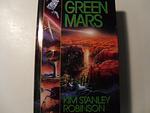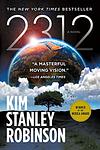Kim Stanley Robinson
Kim Stanley Robinson is an American writer of science fiction. He is best known for his Mars trilogy—'Red Mars,' 'Green Mars,' and 'Blue Mars'—which chronicles the settlement and terraforming of the planet Mars. His work often explores ecological and sociopolitical themes, and he has received numerous awards for his writing, including the Hugo, Nebula, and Locus Awards.
Books
This list of books are ONLY the books that have been ranked on the lists that are aggregated on this site. This is not a comprehensive list of all books by this author.
-
1. Red Mars
The book is a science fiction narrative that chronicles the initial efforts to colonize Mars. It delves into the complex dynamics among the first group of settlers, who come from diverse cultural and scientific backgrounds, as they confront the challenges of terraforming the hostile Martian environment. The story explores themes of ecological transformation, political struggle, and the ethical implications of altering an alien world, while also examining the personal lives and evolving relationships of the colonists. As the settlers work to create a new society on the red planet, their actions set the stage for future generations and the emergence of Mars as a new frontier for humanity.
The 2410th Greatest Book of All Time -
2. The Years of Rice and Salt
The book is an alternate history novel that explores a world in which the Black Death plague of the 14th century was far more lethal to Europeans, nearly wiping them out. As a result, world history is dramatically reshaped: Islamic and Buddhist societies emerge as the dominant global powers, leading to vastly different technological, cultural, and social developments. The narrative spans several centuries, following a group of characters who are reincarnated into various lives and roles, allowing the reader to experience the evolution of this alternate world through their interconnected stories. The novel delves into themes of history, religion, technology, and human nature, all while imagining a world both familiar and strange, shaped by different forces and ideas than those that have shaped our own history.
The 6192nd Greatest Book of All Time -
3. The Ministry For the Future
The book is a speculative fiction narrative that explores the global response to a catastrophic climate crisis through the lens of an international organization tasked with advocating for future generations. Set in the near future, the story weaves together a tapestry of perspectives, from bureaucrats and activists to ordinary citizens, as they confront ecological disasters, economic upheaval, and social transformation. The organization at the heart of the novel employs a mix of diplomacy, policy, and direct action to mitigate climate change, showcasing the complexities and moral dilemmas associated with stewarding the Earth for both present and future inhabitants. The narrative grapples with themes of responsibility, sustainability, and the interconnectedness of global communities in the face of unprecedented environmental challenges.
The 6391st Greatest Book of All Time -
4. Green Mars
In the sequel to the epic tale of Martian colonization, the narrative continues to follow the struggles and developments of the settlers as they advance their terraforming efforts on the Red Planet. The second installment delves deeper into the political, social, and ecological challenges faced by the burgeoning Martian society. As the planet's surface begins to turn green with the spread of plant life, the colonists grapple with the complexities of creating a new world, dealing with the conflicting interests of Earth's transnational corporations, and the emergence of unique Martian cultural and political identities. The story weaves together the lives of the original colonists and the new generation of Martians, exploring themes of revolution, adaptation, and the human spirit's unyielding quest for a better future.
The 6422nd Greatest Book of All Time -
5. Blue Mars
The novel concludes a trilogy that chronicles the colonization and terraforming of Mars, exploring the complex interactions between politics, science, and ecology in the process. As the Martian society stabilizes after a period of revolution and unrest, the inhabitants of the red planet grapple with the long-term implications of their transformation, both for their own society and their relationship with Earth. The narrative delves into the lives of the colonists who have become the first Martians, addressing themes of longevity, environmental responsibility, and the quest for a sustainable future for humanity across two worlds. With a backdrop of a vividly imagined Martian landscape, the story reflects on the human capacity for adaptation and the ethical dimensions of altering an entire planet's ecosystem.
The 8086th Greatest Book of All Time -
6. 2312
Set in the 24th century, the novel explores a future where humanity has colonized the solar system, transforming various planets and moons to support life. The story follows Swan Er Hong, a resident of Mercury, who becomes embroiled in a complex conspiracy after the death of her grandmother, a prominent figure in the space-faring society. As Swan travels through the meticulously terraformed worlds and space habitats, she uncovers a plot that threatens the delicate balance of the interplanetary ecosystem. The narrative weaves together themes of environmentalism, political intrigue, and the boundless potential of human innovation, all while examining the social and personal ramifications of extended life spans and advanced technology.
The 10996th Greatest Book of All Time





